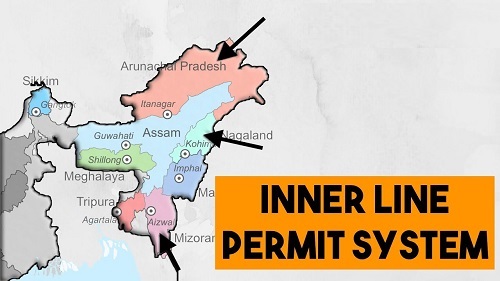Inner Line Permit (ILP) System: Merits & Demerits

The North Eastern States of India are protesting against the newly passed Citizenship (Amendment) Act. Apart from seeking withdrawal of the Act, they also demand ILP be implemented across the Northeast. Following the passage of the Citizenship Act, violent protests broke out in Assam, which led to the death of two of the protesters while clashing with the police. This violence quickly intensified and spread across to the neighbouring states of Tripura and Meghalaya. The entire seven sister states are demanding for the Inner Line Permit, a crucial demand in the debate surrounding the Act.
This topic of “Inner Line Permit (ILP) System: Merits & Demerits” is important from the perspective of the UPSC IAS Examination, which falls under General Studies Portion.
What is Inner Line Permit?
- The Inner Line Permit (ILP) is a travel document that allows the Indian citizens to visit or stay for a fixed time in the states that are secured under the ILP system.
- Currently, the North-Eastern states of Arunachal Pradesh, Manipur, Nagaland, and Mizoram come under the ILP system.
- ILP is issued by the concerned state governments and can be availed by applying online or in person.
- These documents differ based on the purpose of the visit. It specifies the date of the visit and the particular areas in the state that the ILP holder can visit.
How did ILP come to be?
- The ILP came to existence during the British colonial era.
- The British colonial government had passed the Bengal Eastern Frontier Regulation Act, 1873 to restrict and regulate the entry and stay of the outsiders in the designated areas.
- The purpose of this law was to protect the British government’s commercial interests by preventing the “British subjects” (Indians) from trading within the specified regions.
- In 1950, the Government of India had replaced the term “British subjects” with “Citizen of India”.
- Currently, this law is used to protect the interests of the indigenous people by controlling the flow of the population into these regions.
- The Northeast is the home to 238 indigenous tribes that contribute 26% of the region’s population.
Why are North-Eastern states currently demanding for it?
- The Citizenship (Amendment) Act, 2019 allows the non-Muslim refugees who arrived in India before December 31, 2014, from Bangladesh, Pakistan and Afghanistan to obtain Indian citizenship.
- While mainland India has taken to the street, calling this Act to be anti-Muslim, the North Eastern States are protesting for a different issue.
- If this Act is implemented with the ILP, the beneficiaries will be banned from settling in the areas under the ILP regime.
- Arunachal Pradesh and Nagaland, who are part of the ILP regimes are not affected by the migrants from Bangladesh.
- Mizoram shares border with Bangladesh and being a part of the ILP system, it is not affected by this issue.
- However, Assam, Tripura, and Meghalaya are facing the highest migration from Bangladesh and they are not part of the ILP system.
- Thus, Assam and Tripura are protesting against this Act since they share the longest borders with Bangladesh and have faced the highest influx of Bangladeshi immigrants.
- Assam has faced numerous protests since the 1970s due to the increase in undocumented immigrants. This agitation had ended following the Assam Accord in 1985.
- The Assam Accord is the agreement between the Centre and the protesters in response to the 1970s agitations. It was signed on the independence day in 1985 focusing on:
- Foreigners issue
- Economic development
- Restricting acquisition of immovable properties by the foreigners
- Prevention of encroachment of government lands
- Registration of births and deaths
- The agreement was signed to ensure the protection of the social, economic and cultural identity of the locals.
- As per clause 5 of the Accord, those illegal immigrants who entered Assam until December 31, 1965, will be granted citizenship with voting rights immediately.
- It also states that illegal immigrants who came to Assam between 1966 and March 24, 1971, to be excluded. They are to register themselves as foreigners under the Registration of Foreigners Act, 1939. The rest of the illegal immigrants had to be expelled.
- The amended Citizenship Act has shifted the cut-off date for granting the citizenship from 24th March 1971 to 31st December 2014. The protesters see this as a move by the Centre to go back on their promise made in the Assam Accord.
- Furthermore, according to the anti-Citizenship Amendment Act protesters, clause 6 of the Assam Accord has also been violated.
- As per this clause, the Centre should take constitutional, legislative and administrative steps to “protect, preserve and promote the cultural, social, linguistic identity and heritage of the Assamese people.
- Thus, Northeastern States, unlike the rest of India, fear that their identity is under threat, leading them to demand ILP – one of the tools to protect their identity and other interests.
Conclusion:
There are many reasons for protests against the recently passed Citizenship Amendment Act. In a democracy, sound debate and all-inclusive ideas and laws are vital components. The politicians should not make use of the people’s fear of their political advantage. Instead of fear-mongering, suppression, and misinformation, the government and all parties involved can come together for a constructive debate, the one that brings forth unity rather than a divide.


